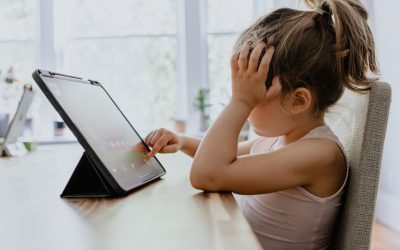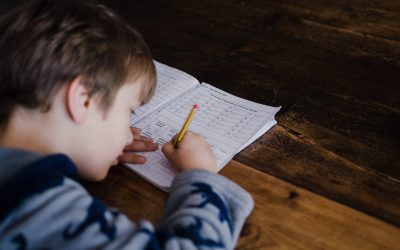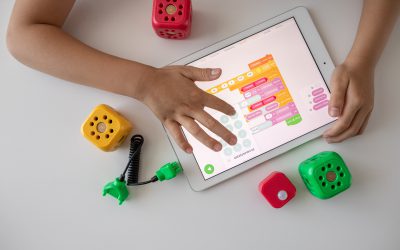Parents as personalized teachers
10 Apr 2020 | Parents, Professionals
How effective is home-schooling? In this blog, Professor Meeter summarizes the research on distance learning, homework, tutors and one-on-one education with an adult and in online environments to answer this question. There is reason for optimism he argues, especially when parents and teachers in the current situation are able to provide pupils with frequent feedback, are able to support students who are stuck and coach them to progress.
Prof. Dr. Martijn Meeter, m.meeter@vu.nl
10-04-2020

This morning, like many other parents, I was a home-schooling teacher. I was trying to help an elementary school child with math, while keeping an eye on a middle schooler whose attention wandered from her textbook to her cell phone. Like many parents, I constantly doubt how effective this all is. Are our children still learning during Corona times? Are there findings out there that can inform us about this?
How effective is home-schooling?
The educational literature gives us reasons for hope, but also for gloom. To start with the latter, there are categories of pupils who have always received home schooling – for example, skipper’s children, or children whose parents objected to ‘normal’ education for ideological or theological reasons (or wanted to travel around the world). In most countries home schooling is a relatively marginal phenomenon, but from 2000 onwards it began to grow strongly in America as an outgrowth of the school choice movement. In many places there was not much choice for parents, so online schools were set up where pupils could be enrolled for distance learning. These schools at one time educated hundreds of thousands of US pupils. But a report published in 2015 showed that results were extremely disappointing: one year of digital distance learning provided on average only half a year’s progress in subjects such as English or history. In mathematics, such a year even led to a decline: children were on average able to do less at the end of the year than when they started.1
Studies into learning from homework
Homework is a form of education that is also similar to what is happening now. The net effect of homework on learning is around zero, up to the age of about 14.2 There’s no consensus yet on why this is the case. The most important factor seems to me to be that younger students cannot correct themselves, and you don’t learn from your mistakes when you only hear the next day (or even later) that you should have approached problems in a different way.
Tutoring and one-on-one teaching
But there are also reasons for optimism. The most important of these is research into tutors. Little education is as effective as one-to-one teaching with an adult. A lot of research has looked at what tutors do that is so effective.3 Do they tailor education very precisely to their pupil? This does not appear to be the case. Most tutors follow the curriculum quite slavishly (I recognize myself in that), and don’t look very hard for missing skills to work on or misconceptions that they have correct in their pupil. What they do do is having pupils think out loud about how they solve problems, and giving immediate feedback. Both are very effective strategies in education. Which, moreover, are within reach of most parents who are now assistant teachers.
Intelligent tutor systems
A second ground for optimism is that tutors don’t have to be people. There are more and more so-called intelligent tutor systems, computer programs with teaching materials and exercises that support students in learning. In Dutch primary education Snappet, Bingel, Schoolae or Rekentuin are examples, and in secondary education more and more methods are accompanied by digital material that you could with a lot of indulgence call tutor systems. A truly intelligent tutor system builds a kind of model of the student – estimating what the student does and does not understand, where additional help is needed and where not. Such systems have proving to be as effective as human tutors,3,4 but no Dutch online learning system is quite as far advanced as that. What almost all systems can do, however, is make practice adaptive (i.e., set at learner’s level), and give immediate feedback. This is what makes them effective, according to for example effect studies on Snappet use in the classroom. Such systems can be used just as effectively at home as in the classroom.
Students are well equipped for self-regulated learning
A third reason for optimism is that many schools have already laid a foundation of self-regulated learning in their pupils. In Montessori, Dalton and innovative education, pupils are used to taking on tasks themselves, and this way of working is also found in many “classic” schools. In this sense, pupils do what they always do, just in a different place (at home instead of at school). In such personalized learning there are a number of roles for the teacher: giving feedback, helping pupils when they get stuck, and coaching.5 The latter is about evaluating with the pupil, and agreeing on goals and planning. This happens naturally in our home: with some regularity, home teaching is interrupted for a negotiation about whether this difficult task really needs to be done now, or maybe something else can be done first. I also hear from other parents that being a home-teacher is about feedback, help with accidents and coaching.
Whether this is enough we won’t know for a few months. Together with my group I am setting up research on how distance learning has worked out. My expectation, just like that of many others, is that a large number of pupils will have done well at home. The self-reliant with a lot of parental support. And that other pupils have stayed behind, perhaps just like the school choicers in the US.
We’ll see. Until then, it’s important to give a lot of direct feedback, to get our kids going when they get stuck in the materials, and to coach like a pro.
- Woodworth et al. (2015). Online Charter School Study. Stanford, CA: Center for Research on Educational Outcomes.
- Hattie (2008). Visible Learning. New York: Routledge.
- VanLehn (2011). The Relative Effectiveness of Human Tutoring, Intelligent Tutoring Systems, and other Tutoring Systems. Educational Psychologist, 46, 197-221.
- Ma et al. (2014). Intelligent Tutoring Systems and Learning Outcomes: A Meta-Analysis. Journal of Education, 106, 901-918.
- Van Kempen, Hummelen & Meeter (2019). Gepersonaliseerd leren in de VO-praktijk. Didactief Online, https://didactiefonline.nl/blog/blonz/gepersonaliseerd-leren-in-de-vo-praktijk.
See also information for:
Most recent blogs:
How LEARN! supports primary and secondary schools in mapping social-emotional functioning and well-being for the school scan of the National Education Program
Jun 28, 2021
Extra support, catch-up programmes, learning delays, these have now become common terms in...
Conference ‘Increasing educational opportunities in the wake of Covid-19’
Jun 21, 2021
Covid-19 has an enormous impact on education. This has led to an increased interest in how recent...
Educational opportunities in the wake of COVID-19: webinars now available on Youtube
Jun 17, 2021
On the 9th of June LEARN! and Educationlab organized an online conference about...
Homeschooling during the COVID-19 pandemic: Parental experiences, risk and resilience
Apr 1, 2021
Lockdown measures and school closures due to the COVID-19 pandemic meant that families with...
Catch-up and support programmes in primary and secondary education
Mar 1, 2021
The Ministry of Education, Culture and Science (OCW) provides funding in three application rounds...
Home education with adaptive practice software: gains instead of losses?
Jan 26, 2021
As schools all over Europe remain shuttered for the second time this winter because of the Covid...





